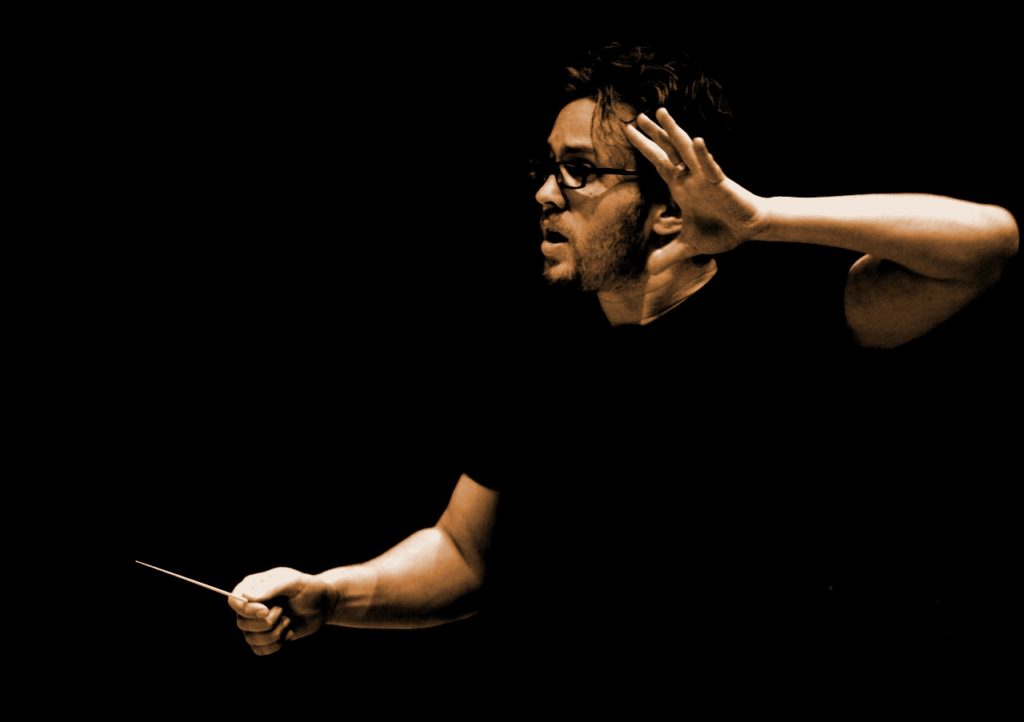By Marc Shulgold
So you think putting an orchestral program together is a snap. Just pick the pieces that everyone loves and you’re all set. If only…
For Austrian-born conductor David Danzmayr, selecting repertory is a fragile art, and one he takes very seriously. Case in point: His two appearances on the podium at the Colorado Music Festival’s second week of concerts in Chautauqua Auditorium. Choosing beloved masterpieces such as Brahms’ Fourth Symphony (July 8 and 9) or Mozart’s Third Violin Concerto (July 11) came easily. How can you lose with masterpieces?
But what about the decision to play unfamiliar pieces – works by little-known or unknown composers? For example, how did Strum by Jessie Montgomery make the cut on the conductor’s first concerts? His second program may end with the comforting strains of Mozart and Haydn, but it begins with another rarity: two movements from the Novelletten for string orchestra by English composer Samuel Coleridge-Taylor.
To begin the selection process, it really helps if he likes a piece. “I’m allergic to over-complicated music,” he says. “I don’t look for originality itself. I look for pieces that enlighten me, that engage me. If it’s not doing anything for me, why play it?”

Conductor David Danzmayr
But the fact is that programming music by living composers, especially little-known ones, remains a tough sell – particularly in the laid-back, sun-drenched world of summer festivals. It’s a good guess that few among the Festival’s audiences are familiar with the composer of Strum. Fear of the unknown is human nature. Not that Danzmayr will make a big deal of it, but his listeners should know that Jessie Montgomery, a 40-year-old violinist/composer from New York City, happens to be a woman of color. And she happens to be one of the most sought-after new voices in American music.
That’s all very nice, Danzmayr acknowledges. “Really, though, identifying the gender and race of a composer isn’t always necessary. It’s certainly not necessary (for audiences) to enjoy the music, which, in the end, has to stand on its own merit. Strum is a wonderful piece, and I think that starting with it and ending with the Brahms (Fourth) is cool.”
Strum was originally written for string quartet (or quintet) and features lively dance rhythms along with folk-flavored plucking and, yes, strumming. As charming as it is, the piece presents challenges for players unfamiliar with its twists and turns – though not necessarily for Danzmayr. “The orchestral version is easier for the conductor,” he claims.
While he’s managed to divide his work between European orchestras and American ones (he was named music director of the Oregon Symphony in February), Danzmayr says he spends most of his time in the States, mostly on the Chicago-based Illinois Philharmonic, which he led for four years. “Ideally, American orchestras need to play American music,” he says. “With the Chicago group, I pledged to conduct an American work on every program.”

Conductor David Danzmayr Rehearsing | Photo by Tom Finnie
Yes, he understands, audiences in this country seem happier with music composed somewhere over in Europe. “For me it’s simple. We play it and see what they think. Accessibility is not always necessary.” As an example, he points to a concert he led in Salzburg. “I did an all-(John) Cage concert there. I think he was a genius. I’ve always respected composers who express their own voice.”
The Cage concert, he says, was “a great success. OK, some may not like it, but if the music shows an honesty, then it’s worth hearing. The same (attitude) with the musicians. They can’t love every piece they play. But they’re professionals.” This mixed reaction to new works even extends to the conductor. “I led a concert that included the Symphony No. 2 by (Norwegian composer Johan) Svendsen, and it was a great discovery for me.”
In many ways, a successful concert experience hinges on building trust – between composers, musicians, and their listeners. Danzmayr doesn’t shy away from the role he must play in this delicate relationship. “A conductor can build a confidence level in everyone. I try very hard at that, including what pieces I’ve chosen on the program.”
He pointed to Festival general manager Alberto Gutierrez as crucial in the planning process, noting, “I have a great relationship with Alberto.” And so, the task of assembling an enjoyable orchestral program for a warm summer evening is a subtly complex challenge, but one that invigorates a passionate musician such as David Danzmayr. “I’m trying to strike a balance,” he says. “I don’t want to overplay the happy stuff.”
David Danzmayr will lead the Colorado Music Festival Orchestra in two programs. On Thursday, July 8 and Friday, July 9 he’ll conduct music by Jessie Montgomery, Saint-Saëns, and Brahms, with pianist Stewart Goodyear as soloist; on Sunday, July 11 his program includes works by Samuel Coleridge-Taylor, Mozart, and Haydn.
